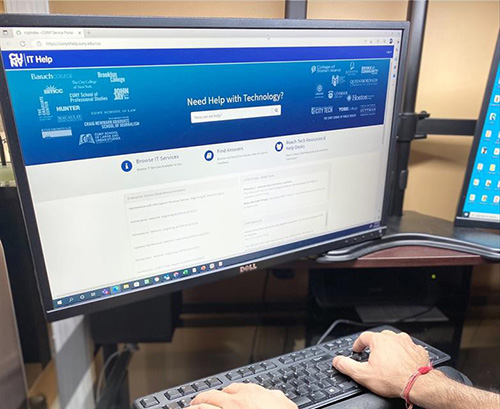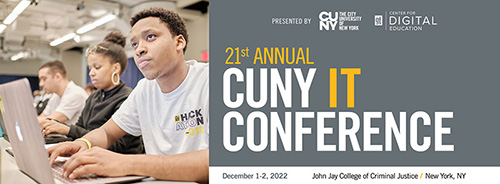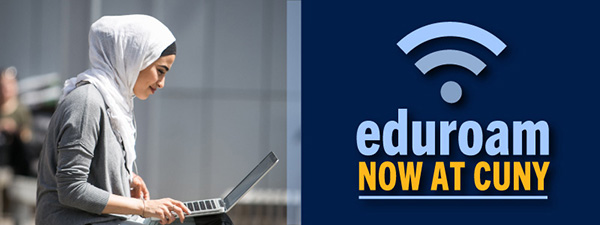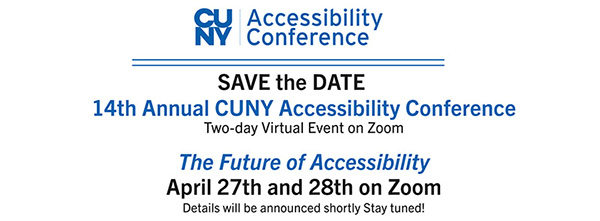Colleges are Moving to ServiceNow
 Students, faculty and staff with multiple college affiliations may experience differences in how the colleges provide technology support and manage requests for services. With many common applications and services across CUNY, it seems reasonable to ask “why not have a common approach to do both?” For the colleges working with CIS to deploy ServiceNow, there will be.
Students, faculty and staff with multiple college affiliations may experience differences in how the colleges provide technology support and manage requests for services. With many common applications and services across CUNY, it seems reasonable to ask “why not have a common approach to do both?” For the colleges working with CIS to deploy ServiceNow, there will be.
All CUNY members can currently log in to CUNY IT Help–our ServiceNow portal for end users–and click on the Catalog menu option to view the list of CUNY-wide services available to them. Once a college has implemented ServiceNow, that college’s users will also view the college-specific services available to them in CUNY IT Help, such as “account reset” and “classroom support.” Regardless of the service requested, ServiceNow will provide a common workflow and user interface through the CUNY IT Help portal. And, once a technology issue has been reported or a service request initiated, users can view the status, add attachments, and communicate with the assigned technician as work progresses by clicking on the Requests menu option.
As part of their service catalog, colleges can also publish a knowledge base of articles supporting the applications and services they provide. As in the case of available services, college-specific knowledge articles are only available through CUNY IT Help to users affiliated with the college.
Colleges moving to ServiceNow will inform their members when the implementation is done. To learn more about ServiceNow capabilities, see the [Demo] CUNY IT Help Service Portal-End-User View recording in Microsoft Stream.
In-Person CUNY IT Conference Draws Crowd
 After 3 years of virtual conferences, the 21st annual CUNY IT Conference was once again held in person at John Jay College on December 1-2, 2022. The conference theme was “The Power and Perils of Scripting,” focusing on the power and influence that scripts play in our educational, professional, and personal lives. The event’s registration– over 1200 CUNY IT, faculty, administrative staff, vendors, and exhibitors–demonstrated a successful return to the in-person format.
After 3 years of virtual conferences, the 21st annual CUNY IT Conference was once again held in person at John Jay College on December 1-2, 2022. The conference theme was “The Power and Perils of Scripting,” focusing on the power and influence that scripts play in our educational, professional, and personal lives. The event’s registration– over 1200 CUNY IT, faculty, administrative staff, vendors, and exhibitors–demonstrated a successful return to the in-person format.
The keynote speaker for day 1 was Matt Sigelman of the Burning Glass Institute, chairman of Emsi Burning Glass and a visiting fellow at the Harvard Kennedy School, who presented “Flipping the Script Between Academia and Industry to Meet the Future of Work.” The keynote speaker for day 2 was Wendy F. Hensel, Executive Vice Chancellor and University Provost who spoke on “Perils and Pitfalls of Programming AI.”
Look for an announcement later this year for the 22nd annual CUNY IT Conference, which will be held on November 30th and December 1st, 2023.
CUNY Transition to Cloud Email Continues

To date, 13 colleges and the Central Office have transitioned to Microsoft 365 email in the cloud. Email users that have already transitioned to the Microsoft 365 cloud experience the following benefits:
- Using the same credentials as CUNYfirst (CUNY Login) to access all their CUNY email accounts and Microsoft 365 applications available to faculty and staff in the Microsoft cloud
- Outlook email integration with the other applications in the Microsoft 365 family including Teams, Teams calendar, OneDrive and SharePoint
- Availability status across Microsoft 365 applications linked to their Outlook Calendar
- Anywhere, any time, and more resilient, access to CUNY email across multiple devices
- More secure email through multi-factor authentication and additional spam and malware protection
CIS continues working with the remaining colleges to help them transition so their email users receive these same benefits. In addition to the colleges’ Microsoft 365 email resources specific to their transition, CIS Training provides an Email Transition to Microsoft 365 SharePoint site with links to FAQs, user guides, and other resources that may be helpful with pre and post-transition tasks.
Campus Network Upgrades Planned
The COVID-19 pandemic demonstrated the importance of secure, flexible, dependable, high-capacity and high-performing networking infrastructure to support instruction and academic and administrative operations. As the CUNY online and hybrid instruction strategies evolve, even more demands will be placed on the University’s inter and intra-college networking infrastructure.
To help ensure that CUNY’s networking infrastructure can support these demands, CIS initiated a project to help college IT departments design, procure and deploy new/ upgraded networking infrastructure to replace outdated, less secure and underperforming technology. The shared goal is to leverage the collective CIS and college networking knowledge, people resources and buying power to better manage costs, supply chain delays, professional services, and implementation timeline more efficiently than through individual college’s efforts.
CIS will seek approval to order the new network technology and supporting professional services on behalf of the colleges. With approval, the networking infrastructure upgrades will begin in 2023.
Progress in Deploying eduroam Across CUNY

CIS continues to work with colleges to deploy eduroam’s free and secure internet access across their campuses. Thus far:
- Eighteen colleges have deployed eduroam Wi-Fi hotspots (wireless access points) in library and campus locations
- The growing number of wireless access points across CUNY exceeds 3600
- Thousands of CUNY students, faculty, staff and guests have accessed eduroam over the CUNY wireless access points
Even if your college has not yet deployed eduroam wireless access points, you can still access the internet for free from any global eduroam Wi-Fi hotspot. To set up your device, see How do I connect to eduroam? in CUNY IT Help.
For more information on eduroam at CUNY, please visit cuny.edu/eduroam.
CUNY Accessibility Conference 2023
The 14th Annual CUNY Accessibility Conference is scheduled for Thursday, April 27 through Friday, April 28 from 10:00 am to 4:00 pm each day. The theme for this year’s conference is “The Future of Accessibility.” Zoom sessions and keynote speakers will be announced shortly.

This year’s CUNY Accessibility Conference will be collaborating with ReelAbilities Film Festival that will feature a presentation, discussion, and screening on inclusion in film.
For the latest information about the conference, please visit the conference website. There is also a pre-registration form if you would like to be notified when conference registration opens.
More Resilient Internet Access
CIS is improving the CUNY fiber network to increase resiliency and minimize network downtime. CIS will accomplish this goal by creating dual points of fiber entry for all colleges attached to the Manhattan, Bronx, Brooklyn, Queens and Staten Island fiber rings.
Dual points of entry create two fiber paths from the CUNY network to college campuses: should one fiber path become inoperable the second fiber path will provide connectivity allowing for normal operations and the ability of the damaged fiber cable to be repaired with no network outage. For example, Hostos Community College had a second fiber cable installed in September 2022 and, in October, experienced a fiber cut. Significant network downtime was avoided by having already implemented the dual entry model.
Lehman College, Hostos Community College, Bronx Community College, Borough of Manhattan Community College, New York City College of Technology, LaGuardia Community College and The CUNY Office of Computing and Information Services have already been completed.